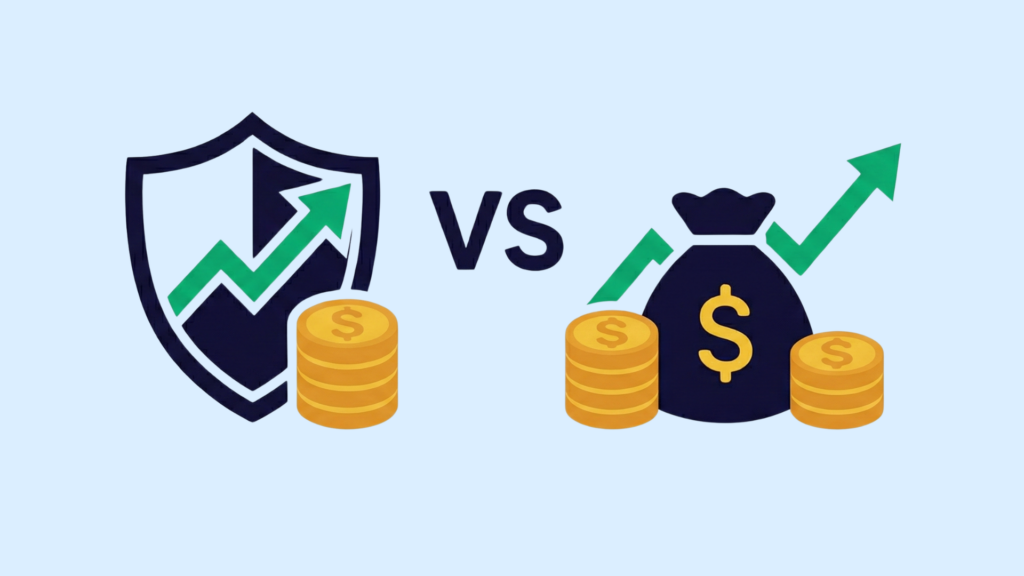When it comes to building wealth through the markets, most Indian investors start with mutual funds. But within this category, there’s often confusion about index funds vs. mutual funds and how they differ. After all, index funds are a kind of mutual fund, yet their management style, cost structure, and return potential set them apart.
For investors, understanding this difference can directly impact long-term returns, risk exposure, and even how much you pay in fees.
In this article, we’ll break down the difference between index funds and mutual funds, compare their pros and cons, and help you figure out which one may suit your investment goals better.
What Are Mutual Funds?
Mutual funds are investment instruments that collect money from many investors and invest it in a diversified portfolio of securities like stocks, bonds, or a mix of both. The structure allows individuals to benefit from professional fund management without needing to select or track individual investments themselves.
Types of Mutual Funds:
- Equity Funds: Invests in shares of companies and are best for long-term growth.
- Debt Funds: Invest in fixed-income securities like government securities and bonds, preferred for stability and predictable returns.
- Hybrid Funds: Blends both equity and debt to balance growth and stability.
- Other Categories: Include sectoral funds, international funds, and thematic funds catering to specific strategies.
Most mutual funds are managed actively which means that a fund manager and their team research, select, and adjust holdings with the goal of outperforming a benchmark index. This active management comes with higher costs compared to passively managed funds.
What Are Index Funds?
Index funds are also a type of mutual fund, but instead of relying on active stock selection, they follow a passive investing approach. An index fund replicates a particular market index, such as the Nifty 50, Sensex, or S&P 500—they hold the same securities in the same proportion.
Our Daily SIP at just ₹11 a day provides an accessible entry point for investors looking to start with minimal capital. With such a small daily amount, you can begin your journey in index investing and steadily grow your portfolio over time, taking advantage of market trends with lower costs.
How Index Funds Work:
- Passive Management: No active stock picking. The fund simply mirrors the performance of its chosen index.
- Lower Costs: Since active research isn’t required, expense ratios are significantly lower.
- Performance: Returns are designed to match the benchmark index, minus minimal costs, closely.
This makes it clear that yes, an index fund is a mutual fund, but it belongs to the passive category rather than the actively managed ones.
Key Differences Between Index Funds and Mutual Funds
Investors often ask: what’s the real difference between index funds and mutual funds? While both fall under the broader umbrella of pooled investments, the way they are managed, their costs, and even who they suit best can be very different.
| Aspect | Index Funds (Passive) | Mutual Funds (Active) |
| Management Style | Track a benchmark index (e.g., Nifty 50, S&P 500) | Managed by fund managers who pick stocks actively |
| Costs (Expense Ratio) | Low, typically 0.2% – 0.5% | Higher, usually 1% – 2% because of research and management fees |
| Performance Potential | Matches index returns (minus costs) | Can generate alpha (outperformance), but also risk underperformance |
| Risk Factors | Market risk and tracking error | Market risk and fund manager bias/decision-making |
| Suitability | Suited for beginners, long-term investors, and cost-conscious investors | Suitable for those seeking active management, higher risk tolerance, and goal-based investing |
Basically, index funds are simpler and cheaper which make them ideal for passive investors. In contrast, mutual funds may suit investors who want professional stock-picking and are willing to take on higher costs and risks.
Pros and Cons of Index Funds and Mutual Funds
When talking about index funds vs mutual funds, investors often struggle to pick the right fit. Both have their advantages, but they also come with limitations you should be aware of.
Advantages of Mutual Funds
- Active management: Professional fund managers research, analyse, and pick securities for you.
- Flexibility: You can choose from equity, debt, hybrid, or thematic funds depending on your goals.
- Potential to outperform: In favourable market conditions, actively managed mutual funds may beat the benchmark index.
Advantages of Index Funds
- Low cost: Since index funds passively track benchmarks, their expense ratios are much lower.
- Diversification: With one investment, you get exposure to all stocks in the index (e.g., Nifty 50, Sensex, S&P 500). Starting with ₹11 a day can help you achieve broad diversification while staying within your budget.
- Transparency: Easy to track because they mirror well-known indices.
Limitations of Both
- Mutual funds: Higher management fees and risk of underperformance if the fund manager’s calls don’t work.
- Index funds: No chance of outperforming the index—you only earn what the benchmark delivers, minus costs.
- Both: Market risks remain; no guarantee of returns.
How to Choose Between Index Funds and Mutual Funds
Deciding between index funds and mutual funds depends on your financial goals, risk appetite, and cost preferences.
- Investment goals: For short-term goals or when you need active guidance, actively managed mutual funds may be better. Whereas for long-term wealth creation with minimal costs, index funds work well.
- Risk tolerance: Mutual funds are best for those who are comfortable with a manager’s judgment. Similarly, index funds suit investors that are conservative who prefer consistency with the market.
- Cost sensitivity: If you care about fees and want the lowest possible expense ratio, index funds are more efficient.
- Tax efficiency: Both are subject to capital gains tax rules in India. However, since index funds typically involve lower portfolio churn, they may be slightly more tax-efficient than actively managed mutual funds.
Conclusion
When it comes to index funds vs. mutual funds, there is no one-size-fits-all answer. Index funds offer simplicity, low cost, and returns that track the market, making them attractive to long-term and beginner investors. In contrast, actively managed mutual funds come with the possibility of higher returns but with higher costs and a reliance on the fund manager’s skill.
The right choice is dependent on your financial goals, risk tolerance, and investment style. Whether you lean towards the passive approach of index funds or the active strategy of mutual funds, you need to stay consistent, diversify wisely, and review your portfolio regularly.
Did you know?
US ETFs (Exchange Traded Funds) offer a great opportunity for investors looking to diversify their portfolio with international exposure. With Appreciate, you can now access these ETFs easily, benefiting from the growth of US-based companies. Investing in US ETFs can be a strategic way to tap into global markets, adding stability and potential growth to your investment strategy.
FAQs
Is an index fund considered a type of mutual fund?
Yes, an index fund is a type of mutual fund. The key difference lies in how they are managed—index funds are passively managed and track a benchmark like the Nifty 50 or S&P 500, while actively managed mutual funds rely on fund managers to pick stocks.
Which is better for beginners: index funds or mutual funds?
For beginners, index funds are often easier to start with because of their low cost, diversification, and simplicity. However, actively managed mutual funds may be suitable if you want professional stock selection and are willing to pay a higher expense ratio.
Do index funds always give lower returns than mutual funds?
No, index funds don’t always give lower returns. While actively managed mutual funds aim to beat the market, many struggle to outperform their benchmarks consistently after factoring in fees. Index funds deliver returns in line with the index, making them competitive over the long term.
What are the risks of investing in index funds?
The main risks of index funds include market volatility, no protection from downturns, and tracking errors. Since they mirror an index, they will also fall when the broader market declines.
How do I decide between index funds and actively managed mutual funds?
The choice is dependent on your investment goals, risk appetite, and sensitivity to cost. If you prefer low-cost, predictable returns that match the market, index funds are a good choice. On the other hand, if you want the chance of beating the market and are comfortable with higher costs, actively managed mutual funds may be more suitable.
Disclaimer
The information provided in this article is for educational and informational purposes only. It should not be considered as financial or investment advice. Investing in stocks involves risk, and it is important to conduct your research and consult with a qualified financial advisor before making any investment decisions. The author and publisher are not responsible for any financial losses or gains that may result from the use of this information.























